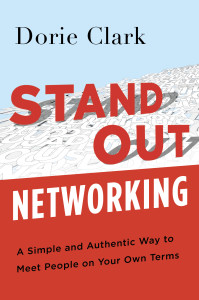Building and nurturing a network of contacts is essential to success in nearly any endeavor or field you enter. Networking has obvious implications for professional growth, but it also can lead to a richer, more fulfilling life in general. Hard to believe something that is painful for many people to do could make you happier? That idea is not a stretch if you buy into the ideas presented by personal branding expert Dorie Clark in her book Stand Out Networking: A Simple and Authentic Way to Meet People on Your Own Terms (Penguin, 2015). If you are unsure how to get the most out of networking or apprehensive about taking the plunge into networking activities, this quick read is worth checking out.
Preparing to Network
Among the most valuable takeaways in the book are ideas shared in the Introduction and first chapter. In the Introduction, Clark points out that networking to grow your business should not be viewed as dirty, but treating it solely as a means to an end is damaging. In other words, if the focus of your networking efforts is how meeting people can help you land new clients or make more money, you will likely not be an effective networker and will wonder why you struggle to see payoffs from your networking activity.
To change what you get out of networking, you must change your inputs into networking. Those inputs begin with the mindset held. The goal of networking is to turn brief encounters into real, long-lasting, and mutually beneficial relationships. That view is far removed from treating networking like a game to see how many contacts you can make and whether any of them can benefit you now.
So what does it take to have a networking mindset that focuses on relationships rather than merely making connections? Clark gives three pieces of advice on mindset:
- Defer short-term gain to build long-term relationships– Avoid the temptation to ask for favors or help immediately. Focus on getting to know the other person to understand you can help them as well as recognizing how he or she can help you.
- Find common ground with people you meet– One of the fastest ways to convert a stranger into a friend is to identify and build on common interests or experiences.
- Look how to add value for others instead of how to extract value from people you meet– Too often, people engage in networking in an attempt to get something from the other party (an introduction to someone else, a job interview, or make a sale). Instead, focus on how you can deliver value to them so that they would be willing to do something for you.
When a networking mindset is established that takes an outward looking, long-term view, you will be guided into engaging in networking activities that makes you valuable and set you apart from most people who are driven by solely by personal gain motives.
The Role of Luck in Networking
I found the theme and content of Chapter 6 (Getting Lucky) very refreshing. While the Introduction and Chapter 1 dealt with how we should think about networking, Chapter 6 acknowledges an emotional component is involved, too. Clark advocates developing a lucky attitude. Rather than viewing networking as a necessary evil required to get ahead, she suggests embracing networking for the possibilities it brings in terms of broadening your network to include more interesting and diverse people. Three traits of a lucky attitude are identified:
- Humility– A willingness to meet and learn from new people)
- Curiosity– A genuine interest in others makes connecting easier
- Optimism– Sparks a desire to embrace opportunities to expand one’s network
When feelings associated with networking shift from “it’s something I have to do” to “it’s something I get to do,” you avail yourself to growth opportunities that you might otherwise unintentionally block.
Why and How
Many business books are long on telling us why the topic is important but shed little light on how to become better or more effective. Stand Out Networking stands out (pun intended) in that Clark shares many practical, usable tips for becoming more comfortable with networking. Regardless of your comfort level with networking, you will likely come away with a different outlook and ideas you can implement to become more effective at networking.

